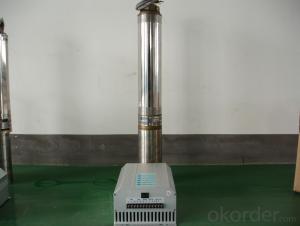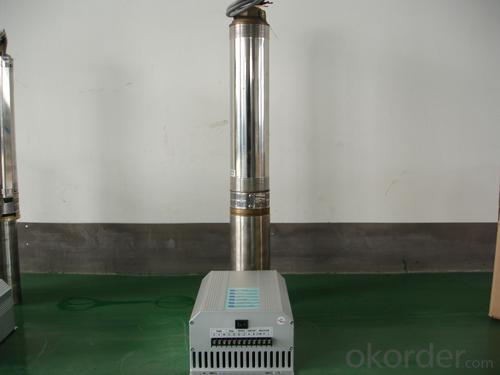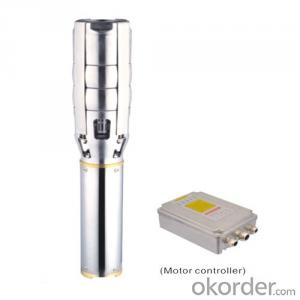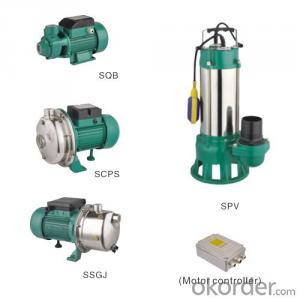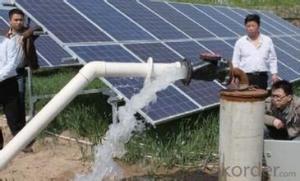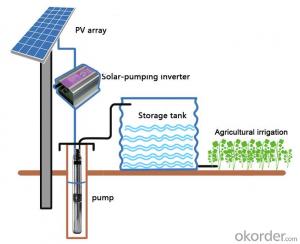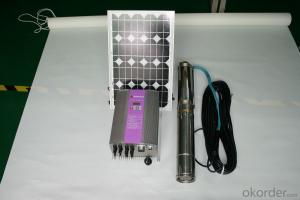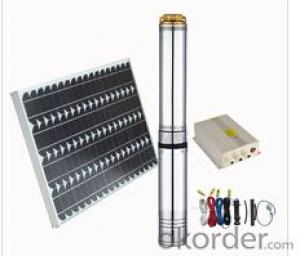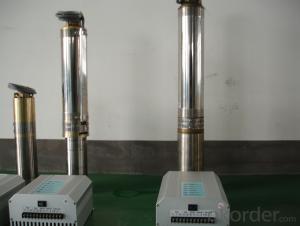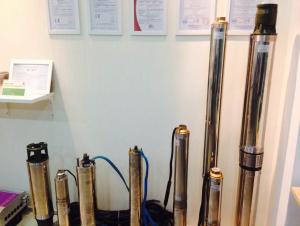Solar Pump Price for Solar Water Pump (110v)
- Loading Port:
- China Main Port
- Payment Terms:
- TT OR LC
- Min Order Qty:
- -
- Supply Capability:
- -
OKorder Service Pledge
OKorder Financial Service
You Might Also Like
Item Description :
This superb new addition to our solar fountain range comes with a 10w solar panel,and a powerful fountain pump that is capable of producing fountains of up to 2m in height. As well as being easy to set up and use.Instruction manual is supplied for assembly and maintenance.
Solar Fountain Key Features :
Powered by direct sunlight
No high voltage electric mains required
Safe for children
Max. height of fountain: 2M
Max. flow capacity: 800 L/H(176 GAL)
10W Polycrystalline solar panel included
18V DC brushless pump
Solar Pump Features :
Can produce fountains up to : 2M (tube height) 1.4M (fountain height)
Comes with multiple nozzle accessories
Cable Length : 5M
Solar Panel Features :
10W peak power.
Polycrystalline highly efficient solar panel
Comes mounted in aluminium frame
Comes with ground stake and rotating knob so you can angle your panel toward the sun
What You Will Get :
10W solar panel
Solar pump
Ground Sake
Nozzle accessories
Precautions :
DO NOT alter or change the product itself or its components
Operate pump in freshwater only, never above 50 degrees celsius
Keep away from flammable liquids
Do not connect to any other power supply other than the included
- Q: Can solar pumps be used in conjunction with rainwater harvesting systems?
- Yes, solar pumps can indeed be used in conjunction with rainwater harvesting systems. Solar pumps are a sustainable and cost-effective way to extract and distribute water, making them a perfect match for rainwater harvesting systems. The solar panels provide the necessary power to run the pump, allowing water to be efficiently pumped from the rainwater storage tanks for various uses such as irrigation or domestic needs. By combining solar pumps with rainwater harvesting systems, individuals can maximize water usage while minimizing dependence on traditional electricity sources.
- Q: How does a solar pump help in reducing electricity bills?
- A solar pump helps in reducing electricity bills by utilizing solar energy to power the pump instead of relying on electricity from the grid. This eliminates the need for consuming conventional electricity, which in turn reduces the amount of electricity consumed and ultimately leads to lower electricity bills.
- Q: Can a solar pump be used for water supply in dairy farms?
- Yes, a solar pump can be used for water supply in dairy farms. Solar pumps utilize sunlight to generate power for pumping water, making them a sustainable and cost-effective solution for water supply in agricultural settings. They can effectively meet the water requirements of dairy farms, ensuring a reliable source of water for the animals and various farm operations. Additionally, solar pumps are environmentally friendly and can reduce dependence on traditional energy sources, making them a suitable choice for sustainable farming practices.
- Q: Can a solar pump be used for water desalination?
- Yes, a solar pump can be used for water desalination. Solar pumps are often used to power reverse osmosis systems, which is a common method of desalination. These systems use the energy from the solar pump to push water through a semi-permeable membrane, separating the salt and other impurities from the water. This process can effectively desalinate water and make it suitable for drinking or irrigation purposes.
- Q: How much sunlight is required for a solar pump to operate effectively?
- The amount of sunlight required for a solar pump to operate effectively depends on several factors such as the type and capacity of the pump, the location, and the specific requirements of the application. In general, solar pumps are designed to work optimally in areas with ample sunlight. They require direct sunlight to generate electricity through photovoltaic (PV) panels, which then powers the pump. Most solar pumps are capable of operating with varying levels of sunlight, but the efficiency and performance of the pump may be significantly reduced in low light conditions or during cloudy days. The exact amount of sunlight required can vary, but as a general guideline, a solar pump typically requires at least 4 to 5 hours of direct sunlight per day to operate effectively. It is important to note that some solar pumps are equipped with battery storage systems which allow them to operate even when sunlight is not available. These pumps can store excess energy generated during the day and use it later when sunlight is limited. This feature can help ensure continuous operation even in low light conditions or during nighttime. To determine the specific sunlight requirements for a solar pump, it is advisable to consult the manufacturer's specifications or seek professional advice from a solar pump installer or supplier. They can provide more accurate information based on the specific pump model and application requirements.
- Q: Can solar pumps be used for water supply in dairy farms or livestock facilities?
- Yes, solar pumps can be used for water supply in dairy farms or livestock facilities. Solar pumps are a sustainable and cost-effective solution that can provide a reliable water source for animals. They can help reduce dependency on grid electricity and diesel generators, making them an environmentally friendly choice for water supply in agricultural settings.
- Q: Can a solar pump be used in areas with limited access to electricity?
- Yes, a solar pump can be used in areas with limited access to electricity. Solar pumps are designed to operate using solar energy, which converts sunlight into electricity to power the pump. This makes them an ideal solution for areas where conventional electricity is not readily available or unreliable. By harnessing the power of the sun, solar pumps can provide a sustainable and cost-effective solution for pumping water in remote locations, such as rural areas or off-grid communities. They can be used for various applications, including irrigation, livestock watering, or even providing clean drinking water. The availability of solar energy ensures that these pumps can continue functioning even in areas with limited access to electricity, making them an excellent option for promoting sustainable development and improving access to water resources in such regions.
- Q: What are the benefits of using a solar pump?
- The benefits of using a solar pump include reduced energy costs, environmental sustainability, and increased independence from traditional power sources. Solar pumps utilize renewable energy from the sun, resulting in lower electricity bills and long-term savings. They also contribute to a greener and cleaner environment by reducing carbon emissions and minimizing reliance on fossil fuels. Additionally, solar pumps provide an independent water supply solution, especially in remote areas with limited access to electricity grids, promoting self-sufficiency and resilience.
- Q: What is the expected lifespan of the controller in a solar pump?
- The expected lifespan of a controller in a solar pump can vary depending on various factors such as the quality of the controller, usage patterns, maintenance, and environmental conditions. However, on average, a well-maintained and high-quality controller can be expected to last for around 10 to 15 years.
- Q: Can a solar pump be used in areas with limited access to maintenance services?
- Yes, a solar pump can be used in areas with limited access to maintenance services. Solar pumps are designed to be low maintenance and reliable, requiring minimal upkeep. They have fewer mechanical parts compared to traditional pumps, reducing the chances of breakdowns and the need for frequent maintenance. Additionally, solar pumps do not require fuel or electricity, making them ideal for remote areas where maintenance services may be scarce.
Send your message to us
Solar Pump Price for Solar Water Pump (110v)
- Loading Port:
- China Main Port
- Payment Terms:
- TT OR LC
- Min Order Qty:
- -
- Supply Capability:
- -
OKorder Service Pledge
OKorder Financial Service
Similar products
Hot products
Hot Searches
Related keywords
